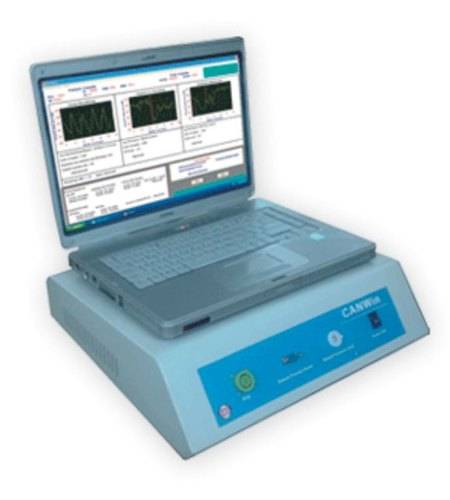Cardiac Autonomic Neuropathy (CAN) is a disorder that can cause a variety of symptoms as well as consequences since it affects both the heart and the autonomic nerve system. . Early detection and proper management strategies are crucial in preventing the progression of this condition. In this comprehensive guide, we will explore the diagnosis and symptoms of CAN, its causes, risk factors, and potential complications. We will delve into the world of Cardiac Autonomic Neuropathy (CAN) Analysis Systems, advanced diagnostic tools used to assess CAN. We will also discuss treatment options, prevention strategies, and management strategies for this condition.
Understanding Cardiac Autonomic Neuropathy
Cardiac Autonomic Neuropathy (CAN) is a disorder that can cause a variety of symptoms as well as consequences since it affects both the heart and the autonomic nerve system. Damage to the nerves that regulate the heart and blood vessels, which results in autonomic nervous system malfunction, is the root cause of CAN. Numerous symptoms, including as variations in heart rate, blood pressure, and digestion, might be brought on by this malfunction.
Exploring Cardiac Autonomic Neuropathy Cardiac Autonomic Neuropathy (CAN) Analysis Systems
CAN analysis systems are advanced diagnostic tools used to assess CAN. These systems utilise non-invasive techniques to measure autonomic function, including heart rate variability, blood pressure response, and sudomotor function. CAN analysis systems are vital in detecting early signs of CAN, monitoring disease progression, and evaluating treatment efficacy.
Types of Cardiac Autonomic Neuropathy Cardiac Autonomic Neuropathy (CAN) Analysis Systems
Cardiac Autonomic Neuropathy (CAN) Analysis Systems encompass various types of diagnostic tools and technologies used for assessing and monitoring the condition. Here are some of the commonly used types of CAN Analysis Systems.
Heart Rate Variability (HRV) Analysis Systems
HRV analysis systems measure the variation in time intervals between heartbeats, providing insights into the autonomic control of the heart. These systems analyse the beat-to-beat intervals to assess the balance between sympathetic and parasympathetic nervous system activity.
Cardiovascular Reflex Tests
Cardiovascular reflex tests evaluate the autonomic nervous system’s response to specific stimuli, such as changes in blood pressure or posture. Tests like the Valsalva manoeuvre, tilt-table testing, and deep breathing tests help assess autonomic function in relation to cardiovascular regulation.
Sudomotor Function Tests
Sudomotor function tests assess the sweat gland activity controlled by the autonomic nervous system. These tests measure sweating response through techniques like the quantitative sudomotor axon reflex test (QSART) or sweat chloride tests.
Thermoregulatory Sweat Testing
Thermoregulatory sweat testing evaluates the distribution and pattern of sweat production across the body. By monitoring sweating response to thermal stimuli, these tests provide information about autonomic nervous system dysfunction.
Autonomic Function Tests
Autonomic function tests encompass a range of assessments that evaluate various aspects of autonomic nervous system function. These tests may include cardiovascular reflex tests, sudomotor function tests, pupillary reflex tests, and other measures of autonomic responses.
Nerve Conduction Studies
Nerve conduction studies assess the electrical conduction of peripheral nerves, which can be affected by autonomic neuropathy. These studies measure the speed and amplitude of nerve signals, helping to identify peripheral nerve damage associated with CAN.
Imaging Techniques
Advanced imaging procedures like cardiac MRIs or positron emission tomography (PET) scans can provide light on the innervation and operation of the heart’s autonomic nervous system.
Recognizing CAN Symptoms
The severity of CAN symptoms, which can affect cardiovascular health and general wellbeing, can range from moderate to severe. Common symptoms include heart rate variability, blood pressure changes, and gastrointestinal dysfunction. Early detection and proper management strategies are crucial in preventing the progression of this condition.
Effective Treatment Options for CAN
Treatment options for CAN include medical interventions, lifestyle modifications, and preventive measures. Medication to regulate blood pressure, heart rate, and blood sugar levels may be part of medical treatments. Lifestyle modifications may include dietary changes, exercise, and stress management. Regular monitoring of cholesterol, blood pressure, and blood sugar levels are examples of preventive strategies.
Understanding the Prognosis of CAN
The severity of the ailment, the underlying aetiology, and the existence of other medical disorders are some of the variables that affect the prognosis of CAN. Early detection and proper management strategies are crucial in preventing the progression of this condition and reducing the risk of potential complications.
Uncovering CAN Risk Factors
CAN risk factors include diabetes, cardiovascular diseases, and other medical conditions that impact autonomic function.Those who have a family history of diabetes or cardiovascular disease may be more susceptible to CAN.
Preventing CAN: Tips for a Healthy Heart
Prevention strategies for CAN include lifestyle modifications, self-care practices, and medical interventions. These tactics may consist of consistent physical activity, a balanced diet, stress reduction techniques, and routine blood pressure, cholesterol, and blood sugar checks.
Managing CAN: Improving Heart Health
Management strategies for CAN include a combination of medical treatments and lifestyle adjustments. These methods may include dietary modifications, physical activity, stress reduction, and pharmaceuticals to regulate blood pressure, heart rate, and blood sugar levels.
Unveiling CAN Complications
From moderate to severe, CAN issues can affect cardiovascular health and general well-being. Heart failure, arrhythmias, and sudden cardiac death are possible complications. Complications may include heart failure, arrhythmias, and sudden cardiac death. Early detection and prevention strategies are crucial in reducing the risk of potential complications.
Advantages of Cardiac Autonomic Neuropathy Cardiac Autonomic Neuropathy (CAN) Analysis Systems
Cardiac Autonomic Neuropathy (CAN) Analysis Systems offer several advantages in the diagnosis and management of cardiac autonomic neuropathy. Here are some key advantages:
- Early Detection: CAN Analysis Systems enable early detection of cardiac autonomic neuropathy, allowing for prompt intervention and treatment. Early detection can help prevent further progression of the condition and reduce the risk of complications.
- Objective Assessment: These analysis systems provide objective measurements and assessments of autonomic nervous system dysfunction. They use advanced techniques and algorithms to analyse various parameters related to heart rate variability, blood pressure, and other physiological indicators.
- Comprehensive Evaluation: CAN Analysis Systems offer a comprehensive evaluation of autonomic function, providing insights into both sympathetic and parasympathetic components. This comprehensive assessment helps in understanding the overall autonomic balance and identifying specific abnormalities.
- Non-Invasive: The analysis systems are non-invasive, making them safe and comfortable for patients. They utilise non-invasive sensors and devices to measure and analyse autonomic function, eliminating the need for invasive procedures or interventions.
- Quantitative Analysis: CAN Analysis Systems provide quantitative measurements and data, enabling healthcare professionals to track the progression of cardiac autonomic neuropathy over time. This quantitative analysis helps in monitoring treatment effectiveness and adjusting management strategies accordingly.
- Personalised Treatment: By accurately assessing autonomic function, CAN Analysis Systems assist in tailoring treatment plans to individual patients. The obtained data helps healthcare providers in designing personalised interventions, lifestyle modifications, and medication regimens for optimal management of cardiac autonomic neuropathy.
- Research and Innovation: These analysis systems contribute to ongoing research and innovation in the field of cardiac autonomic neuropathy. They provide valuable data for studies, clinical trials, and the development of new treatment approaches, ultimately leading to improved outcomes for patients.
Innovations in Cardiac Autonomic Neuropathy (CAN) Analysis Systems
CAN analysis systems continue to evolve, with cutting-edge technologies and research findings contributing to improved diagnosis, monitoring, and treatment of CAN. These advancements include the development of wearable devices, improved data analysis techniques, and the integration of artificial intelligence in data interpretation.
Stay up-to-date with the latest advancements in CAN analysis systems and other medical devices through Medzell, a futuristic B2B platform for promoting medical devices in emerging markets. Medzell offers a wide range of medical devices, including CAN analysis systems, to provide access to affordable and high-quality medical devices in emerging markets.
Cardiac Autonomic Neuropathy (CAN) Analysis Systems from Leading Manufacturers
CANWin
 The CANWin system, developed by Recorders & Medicare Systems Pvt. Ltd. (RMS India), is a state-of-the-art PC-based device designed for analysing and interpreting cardiac autonomic neuropathy (CAN). With its advanced features and user-friendly interface, CANWin offers a comprehensive assessment of sympathetic and parasympathetic responses of the autonomic nervous system.
The CANWin system, developed by Recorders & Medicare Systems Pvt. Ltd. (RMS India), is a state-of-the-art PC-based device designed for analysing and interpreting cardiac autonomic neuropathy (CAN). With its advanced features and user-friendly interface, CANWin offers a comprehensive assessment of sympathetic and parasympathetic responses of the autonomic nervous system.
Accurate Analysis of CAN
CANWin employs the Ewing Battery of six tests to evaluate both sympathetic and parasympathetic central nervous system (CNS) function. Through automatic and precise R-Peak detection and RR interval calculation, the device ensures reliable measurements and data analysis.
Comprehensive Parasympathetic Function Assessment
For parasympathetic function assessment, CANWin utilizes Tacho Cardio Gramme (TCG) responses to Resting Heart Rate, Deep Breathing, Response to Standing, and Valsalva Maneuver. The system also offers full ECG disclosure of each test, providing detailed insights into parasympathetic function.
Seamless User Experience
CANWin is designed to simplify the testing process, ensuring patient cooperation and ease of use. The unique patient prompt panel intuitively guides patients throughout the tests, facilitating accurate and reliable results. Additionally, CAN tests can be conducted effortlessly using the time domain waveform analysis and built-in BP measurements incorporated into the software.
Validation and Accuracy
Transparency is a hallmark of CANWin’s TCG-based tests, ensuring the validation of results and instilling confidence in healthcare professionals. The software provides a simple and comprehensive solution for the arduous task of evaluating cardiac autonomic neuropathy, saving time and improving efficiency.
Compatibility and Connectivity
CANWin works seamlessly with Windows operating software, providing a user-friendly interface and compatibility with a wide range of systems. The device features a convenient serial port interface, enabling smooth connectivity with other medical equipment and devices.
Precise Blood Pressure Measurement
CANWin includes automatic blood pressure measurement with predetermined protocols for assessing sympathetic function. This feature allows for the evaluation of conditions such as Orthostatic Hypotension and Sustained Handgrip, providing a comprehensive analysis of sympathetic responses.
In conclusion, CANWin is an advanced and reliable cardiac autonomic neuropathy analysis system developed by RMS India. With its Ewing Battery of tests, intuitive patient prompt panel, and comprehensive analysis capabilities, CANWin offers healthcare professionals a powerful tool for evaluating autonomic nervous system function. Its compatibility, accuracy, and user-friendly features make it a valuable asset in diagnosing and managing cardiac autonomic neuropathy.
Conclusion
In conclusion, early detection and proper management strategies are crucial in preventing the progression of CAN and reducing the risk of potential complications. CAN analysis systems are vital in detecting early signs of CAN, monitoring disease progression, and evaluating treatment efficacy. Prevention strategies and management strategies may include lifestyle modifications, self-care practices, and medical interventions. Stay up-to-date with the latest advancements in CAN analysis systems and other medical devices through Medzell, a futuristic B2B platform for promoting medical devices in emerging markets.


